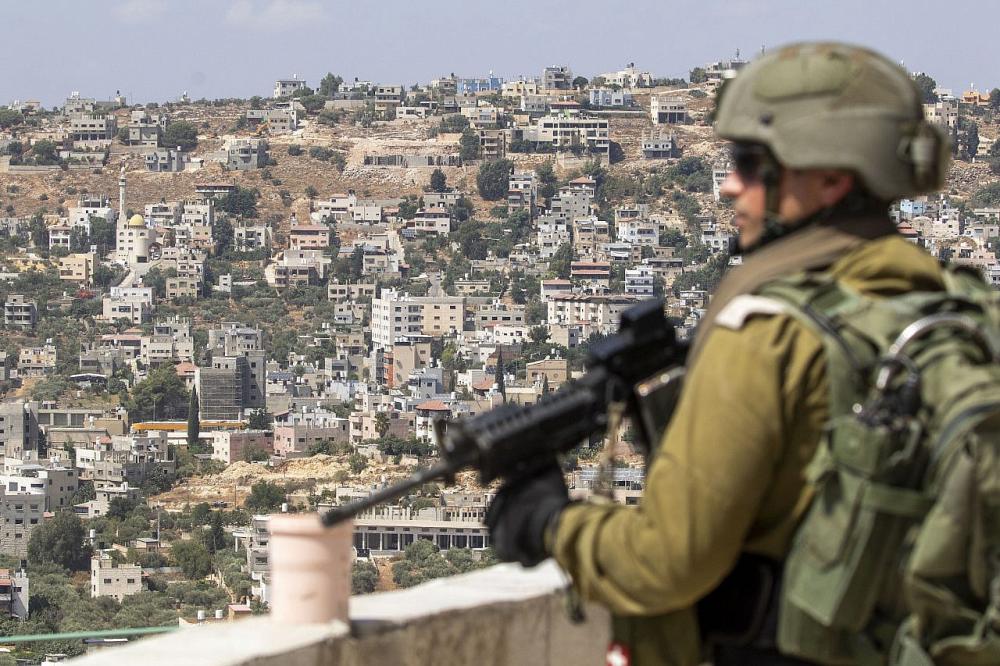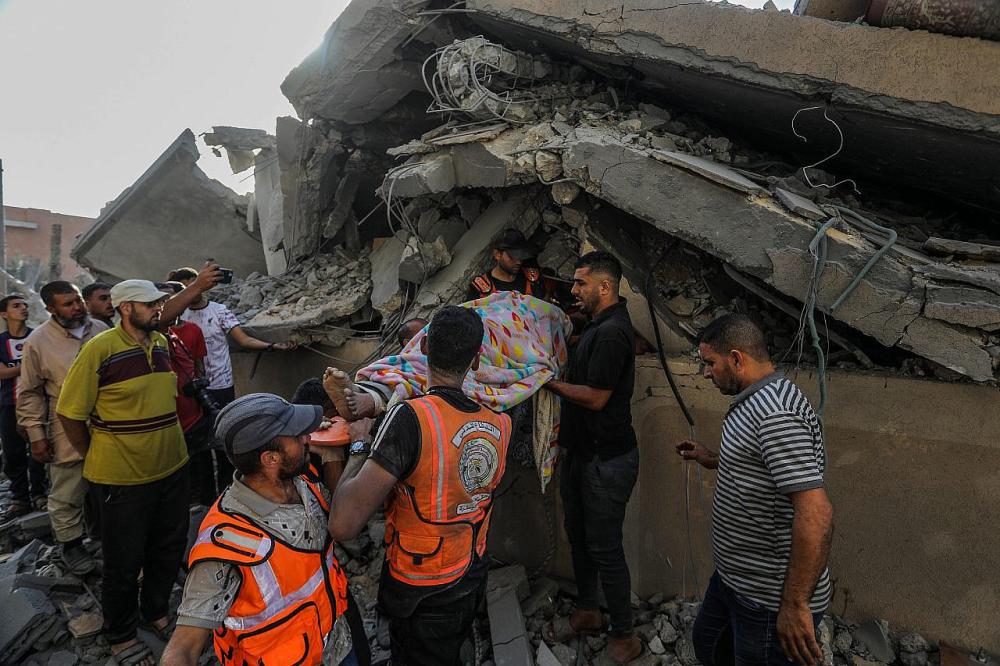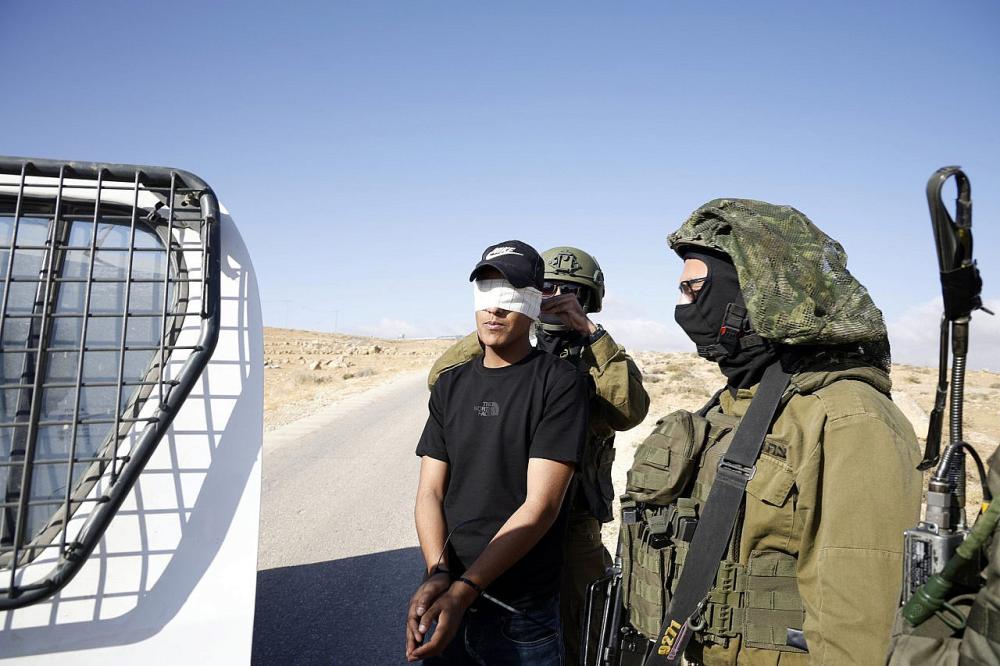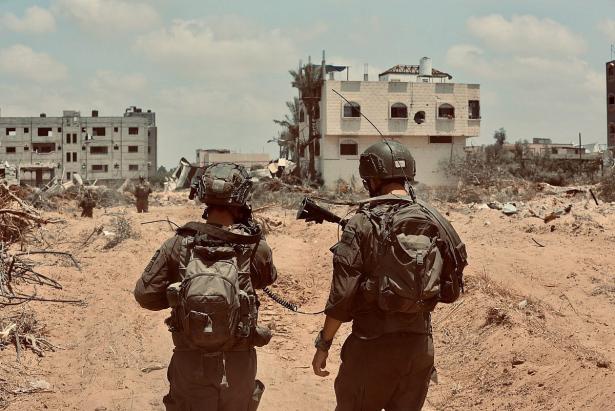Over the past year, many have argued that the October 7 disaster — the largest massacre of Israeli civilians in the country’s history — was a sign that the status quo of permanent occupation has collapsed. Under Prime Minister Benjamin Netanyahu, Israel had been advancing a policy of long-term “conflict management” to bolster its occupation and settlement of Palestinian lands while containing fragmented Palestinian resistance. This involved financing a “deterred” Hamas, which several Israeli leaders considered to be “an asset.”

It’s true that some aspects of this strategy did collapse in the wake of October 7 — especially the illusion that the Palestinian national project could be crushed, or that Hamas and Hezbollah could be kept at bay in the absence of any political agreements. The notion that Jewish settlement could guarantee security along Israel’s borders and frontiers — a long-standing Zionist myth — was also shattered; beyond the deep trauma and grief suffered by dozens of Jewish border communities, some 130,000 Israelis from more than 60 localities within the Green Line were displaced, and most of them remain so.
Other experts have claimed that Israel’s war in Gaza, and now Lebanon, is void of political strategy for “the day after,” and is fought solely for the sake of Netanyahu’s political survival. But contrary to popular opinion, clear-eyed analysis of the past year shows that Israel continues to promote an unmistakable strategic goal in this war: maintaining and deepening the regime of Jewish supremacy over Palestinians between the Jordan River and the Mediterranean Sea. In this sense, the past 12 months might be best understood as Israel’s “first apartheid war.”
While its eight previous wars attempted to create new geographical and political orders or were limited to specific regions, the current one seeks to reinforce the supremacist political project Israel has built throughout the entire land, and which the October 7 assault fundamentally challenged. Accordingly, there is also a steadfast refusal to explore any path to reconciliation or even a ceasefire with the Palestinians.
Israel’s supremacist order, which was once termed “creeping” and more recently “deepening apartheid,” has long historical roots. It has been concealed in recent decades by the so-called peace process, promises of a “temporary occupation,” and claims that Israel has “no partner” to negotiate with. But the reality of the apartheid project has become increasingly conspicuous in recent years, especially under Netanyahu’s leadership.

Israeli forces are seen during a demonstration in Beita, occupied West Bank, July 26, 2024. (Wahaj Bani Moufleh/Activestills)
Today, Israel makes no effort to hide its supremacist aims. The Jewish Nation-State Law of 2018 declared that “the right to exercise national self-determination in the State of Israel is unique to the Jewish people,” and that “the state views the development of Jewish settlement as a national value.” Taking this a step further, the current Israeli government’s manifesto (known as its “guiding principles”) proudly stated in 2022 that “the Jewish people have an exclusive and inalienable right to all areas of the Land of Israel” — which, in the Hebrew lexicon, includes Gaza and the West Bank — and promises to “promote and develop settlement in all parts of the Land of Israel.”
This July, the Knesset voted by an overwhelming majority to reject the establishment of a Palestinian state. And when Netanyahu speaks at the UN, as he did two weeks ago, the maps he shows clearly depict this vision: a Jewish state between the river and the sea, with Palestinians doomed to exist on the invisible margins of Jewish sovereignty as second- or third-class residents.
Ironically and tragically, the terror attacks of Hamas and its partners over the past three decades, as well as their rhetoric of denying Israel’s existence and advocating a future Islamic state between the river and the sea, were invoked as a pretext for Israel’s occupation and oppression of Palestinians. The October 7 massacres can thus be criticized not only as criminal and deeply immoral, but also as a “boomerang rebellion” that returns to enact brutal violence on the Palestinian people and severely undermines their just struggle for decolonization and self-determination. Hezbollah’s offensive in the north has added further fuel to the fire of the boomerang rebellion, which in turn burns its perpetrators.
Repress Palestinians, cement Jewish supremacy
Israel has violently dominated, expelled, and occupied Palestinians for over 75 years. But this history of oppression pales in comparison to the destruction wrought on Gazans over the past year — what many experts have termed a genocide.
Following Israel’s “disengagement” and 17 years of suffocating siege over the Hamas-controlled enclave, Gaza came to symbolize in Israeli eyes a distorted version of Palestinian sovereignty. Hence, much beyond fighting militants or seeking revenge for October 7, Israel’s massive bombardment, ethnic cleansing, and obliteration of most of the Strip’s civil infrastructure — including hospitals, mosques, industries, schools, and universities — are a direct attack on the possibility of Palestinian decolonization and sovereignty.

Palestinians at the rubble of a house hit by an Israeli airstrike in Khan Younis, southern Gaza Strip, October 2, 2024. (Abed Rahim Khatib/Flash90)
Under the fog of this onslaught on Gaza, the colonial takeover of the West Bank has also accelerated over the past year. Israel has introduced new measures of administrative annexation; settler violence has further intensified with the backing of the army; dozens of new outposts have been established, contributing to the expulsion of Palestinian communities; Palestinian cities have been subjected to suffocating economic closures; and the Israeli army’s violent repression of armed resistance has reached levels not seen since the Second Intifada — especially in the refugee camps of Jenin, Nablus, and Tulkarem. The previously tenuous distinction between Areas A, B, and C has been completely erased: the Israeli army operates freely throughout the entire territory.
At the same time, Israel has deepened the oppression of Palestinians inside the Green Line and their status as second-class citizens. It has intensified its severe restrictions on their political activity through increased surveillance, arrests, dismissals, suspensions, and harassment. Arab leaders are labeled “terror supporters,” and the authorities are carrying out an unprecedented wave of house demolitions — especially in the Negev/Naqab, where the number of demolitions in 2023 (which reached a record of 3,283) was higher than the number for Jews across the entire state. At the same time, the police all but gave up on tackling the serious problem of organized crime in Arab communities. Hence, we can see a common strategy across all the territories Israel controls to repress Palestinians and cement Jewish supremacy.
The escalating offensive in Lebanon — which was launched in the name of repelling Hezbollah’s 12 months of aggression against northern Israel, but is now growing into a massive attack on all of Lebanon — and the exchange of blows with Iran apparently herald a new and regional phase of the war. It is clearly linked to the geopolitical agenda of the American empire, but it also serves to distract attention from the deepening oppression of Palestinians.
Another front to the apartheid war is being waged against Jewish Israelis struggling for peace and democracy. The Netanyahu government’s continued attempts to weaken the (already limited) independence of the judiciary will enable further human rights violations by augmenting the power of the executive branch, currently composed of the most right-wing coalition Israel has ever known.

Israeli forces arrest three Palestinians while prevent residents of the Palestinian village of Az-Zuweidin from grazing on their private pastures, southern West Bank, May 4, 2024. (Omri Eran Vardi/Activestills)
We are already seeing the effects of Israel’s descent into authoritarian rule. The country is overrun with weapons thanks to National Security Minister Itamar Ben Gvir’s decision to distribute tens of thousands of rifles, mainly to supporters of Jewish supremacy living in the West Bank settlements or border regions. Finance Minister and de-facto West Bank governor Bezalel Smotrich — himself a hardcore settler — has allocated large sums of public funds to settler projects. And the government has effectively silenced any criticism of Israel’s criminal war: unleashing severe police violence on anti-government and anti-war demonstrators, inciting against academic institutions, intellectuals, and artists, and amplifying toxic and incriminating discourse against left-wing “traitors.”
A particularly sickening dimension of the apartheid war is the government’s abandonment of Israeli hostages kidnapped by Hamas, whose potential return threatens the government by further exposing the fiasco of October 7. Equally, their presence in the Hamas tunnels enables the government to continue its criminal — and largely ineffective — “military pressure” in Gaza, which endangers any chance that the hostages will return alive. Thus, by exploiting the pain and shock of the hostages’ families, the government ensures that we are faced with an ongoing state of emergency that precludes the opening of an official investigation into the negligence that led to the October 7 massacres.
A new political horizon
Looking forward, it is worth remembering that apartheid is not only a moral abyss and a crime against humanity; it is also an unstable regime, characterized by endless violence that spares no one, and far-reaching damage to the economy and the environment.
Despite the considerable support it receives among Jews in Israel and abroad, and from the Western governments that scandalously ensure its impunity, the Israeli regime is far from victorious in its first apartheid war. The forces opposing it are growing not only among the Palestinians and neighboring Arab countries, but also among Jews in the diaspora and the wider publics of both the Global North and South. Apartheid Israel has already lost the moral battle, but losing its international alliances, trade links, economic prospects, and cultural and academic ties may force the government to halt its war for Jewish supremacy.
Yet this is not an inevitable outcome. It requires significant global mobilization to enforce international law, as well as Jewish-Palestinian partnership that will challenge and rupture the apartheid order of legal separation, segregation, and discrimination. The struggle required is civil and nonviolent: similar struggles against apartheid regimes around the world, such as in Northern Ireland, the southern United States, Kosovo, or South Africa, succeeded when they abandoned violence targeting civilians and focused on civil, political, legal, and moral campaigns.
The struggle also requires a political horizon that will respond to the persistent failure to partition the land between the river and the sea. The peace movement “A Land for All: Two States One Homeland,” a joint Israeli-Palestinian initiative, has articulated one such vision based on individual and collective equality. This confederational model of two states with freedom of movement, joint institutions, and a shared capital, can offer a way out of the deepening apartheid and help sketch a horizon toward a future of reconciliation and peace. Only the adoption of such visions can ensure that the first apartheid war is also the last.
A version of this article was first published in Hebrew on Local Call. Read it here.
Prof. Oren Yiftachel is a researcher of political and legal geography and a human rights activist.
+972 Magazine is an independent, online, nonprofit magazine run by a group of Palestinian and Israeli journalists. Founded in 2010, our mission is to provide in-depth reporting, analysis, and opinions from the ground in Israel-Palestine. The name of the site is derived from the telephone country code that can be used to dial throughout Israel-Palestine.
Our core values are a commitment to equity, justice, and freedom of information. We believe in accurate and fair journalism that spotlights the people and communities working to oppose occupation and apartheid, and that showcases perspectives often overlooked or marginalized in mainstream narratives.
+972 Magazine does not represent any outside organization, political party, or agenda. We publish a wide variety of views on our site that do not necessarily represent the opinions of the +972 editorial team.
Click here to read our financial disclosures.
Click here to read our editorial statement regarding our About page.
+972 Magazine is funded by a combination of reader support and grants from various foundations and individuals. Yearly audit and financial reports submitted by “972 — Advancement of Citizen Journalism” can be found here. More information and quarterly reports on donations from foreign entities can be found here. The best way of supporting us is by becoming a member. Learn more about our membership program or on how to make a one-off donation here.
Our team has been devastated by the horrific events of this latest war. The world is reeling from Israel’s unprecedented onslaught on Gaza, inflicting mass devastation and death upon besieged Palestinians, as well as the atrocious attack and kidnappings by Hamas in Israel on October 7. Our hearts are with all the people and communities facing this violence.
We are in an extraordinarily dangerous era in Israel-Palestine. The bloodshed has reached extreme levels of brutality and threatens to engulf the entire region. Emboldened settlers in the West Bank, backed by the army, are seizing the opportunity to intensify their attacks on Palestinians. The most far-right government in Israel’s history is ramping up its policing of dissent, using the cover of war to silence Palestinian citizens and left-wing Jews who object to its policies.
This escalation has a very clear context, one that +972 has spent the past 14 years covering: Israeli society’s growing racism and militarism, entrenched occupation and apartheid, and a normalized siege on Gaza.
We are well positioned to cover this perilous moment – but we need your help to do it. This terrible period will challenge the humanity of all of those working for a better future in this land. Palestinians and Israelis are already organizing and strategizing to put up the fight of their lives.
Can we count on your support ? +972 Magazine is a leading media voice of this movement, a desperately needed platform where Palestinian and Israeli journalists, activists, and thinkers can report on and analyze what is happening, guided by humanism, equality, and justice. Join us.


Spread the word